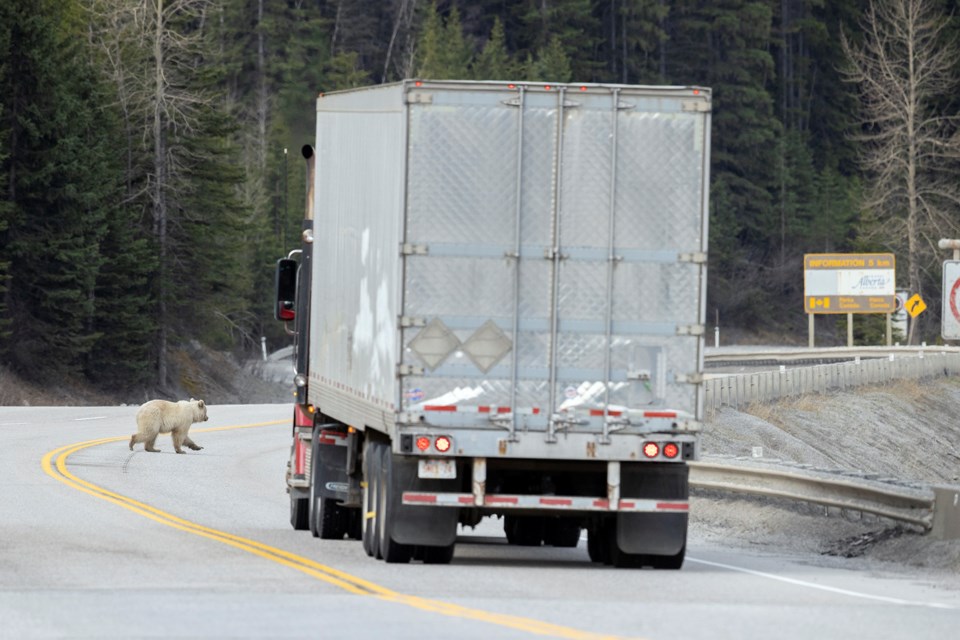FIELD, B.C. – Wildlife advocates are calling on Parks Canada to immediately implement a no-stopping zone in Yoho National Park where grizzly bears are known to feed roadside each spring, including a rare white grizzly bear.
John Marriott, a prominent local wildlife photographer who refers to the white female bear as Nakoda, said Parks Canada should enact a proactive no-stopping 70 km/hr zone on the Trans-Canada Highway, including on the Kicking Horse Hill, which should be backed up by regular patrols.
“There needs to be regular RCMP patrols to accompany the resource conservation patrols and to enforce the speed reduction zone,” he said, noting patrols should start at dawn and run until dusk.
“The no-stopping zone should also be readily moveable for when Nakoda moves back and forth between Lake Louise and the Kicking Horse hill, which she does fairly often.”
Around mid June in 2020, 2021 and 2022, Parks Canada implemented a 10-kilometre no-stopping zone along the Trans-Canada Highway between Sherbrooke Creek near the B.C.-Alberta border and Field due to the many bears in the area.
Last year, a five-year-old female grizzly – the sibling of the rare white grizzly – was killed along the deadly stretch of highway in Yoho National Park. Four days later, a male grizzly was killed in the reduced speed and no-stopping zone.
Keeping the white grizzly bear alive through her subadult years and into adulthood should be the highest priority for Parks Canada, according to Marriott, who noted this bear has shown up along the roadside every year for the past three years, typically in early May.
He said Parks Canada's management has mostly been reactive to date, always after issues have already arisen with Nakoda, causing bear jams and traffic incidents and due to a “tremendous amount of luck.”
“I’ve personally witnessed her avoid getting hit by semi-trucks by less than a metre two times now in the past three years. Her sister was not so fortunate.”
Marriott said there is a good chance the white grizzly bear may show up this year with cubs.
“I don’t think Parks Canada is well situated at all to deal with this possibility,” he said.
“The ground staff is doing all they can, but they need far more support and funding from upper management.”
In the coming weeks, several management tools will be considered and implemented by Parks Canada, as required, in key areas based on risk, such as temporary speed reductions and no-stopping zones, dandelion control in high risk collision areas, and active wildlife management techniques such as hazing to reduce animal time in high risk areas next to roadways.
Installation of an electric wire on the Trans-Canada wildlife fencing in Yoho National Park is currently underway.
"This will be a great step toward ensuring she can't get on the highway, but if it's not happening this spring then it may well prove to be too late for Nakoda," said Marriott.
“This is where further proactive mitigation measures must be enacted as soon as possible, including funding more officers,” he said.
Marriott said this bear is now integral to the grizzly bear population in the Canadian Rockies, with the Lake Louise region being identified as one of three core security areas in Banff National Park.
“The potential loss of another breeding-age adult female from the Banff population cannot be understated, particularly after the loss of so many other female bears in the past two years,” he said.
Parks Canada was unavailable by deadline for an interview.




